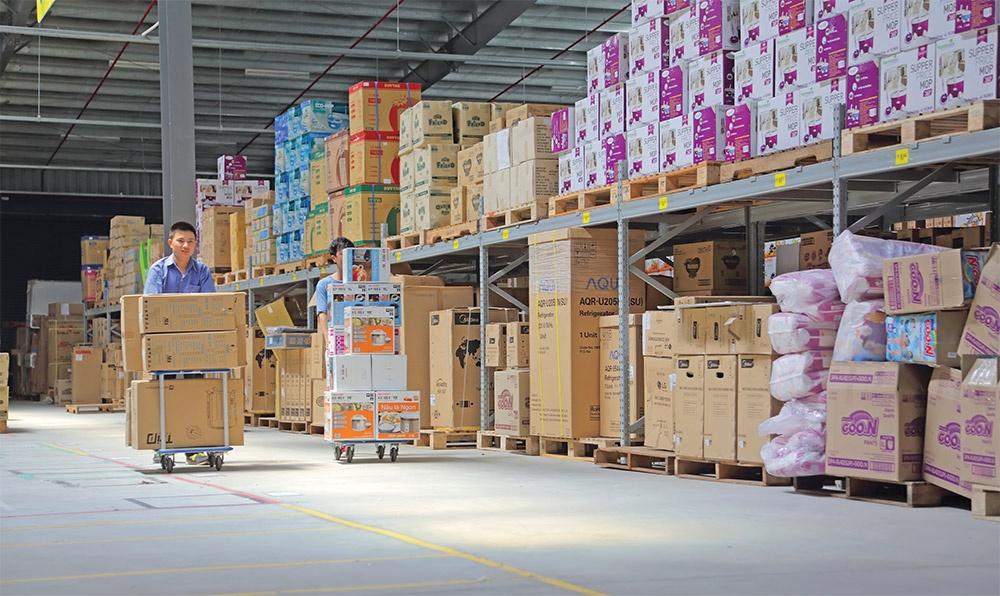Authorities looks to tackle influx of cheap foreign goods
Cross-border e-commerce platforms such as Temu, Shein, and 1688 have been conducting business activities in Vietnam without registration with the Ministry of Industry and Trade (MoIT), and their rising popularity have caught the eye of authorities.
 |
| Domestic e-commerce platforms are being put under pressure by foreign alternatives, photo Le Toan |
A fortnight ago, the MoIT issued a document on strengthening state management on e-commerce. To enhance the effectiveness of law enforcement, the MoIT requires the Vietnam E-commerce and Digital Economy Agency to guide consumers to be cautious with shopping online on cross-border e-commerce platforms, especially on platforms such as Temu, Shein, and 1688.
“Particularly, absolutely do not transact with platforms that have not been confirmed and registered at the e-commerce management portal,” the document highlighted.
The MoIT will propose a study on how to monitor and manage imported goods through e-commerce platforms that do not comply with Vietnamese law, strengthen the protection of consumer rights in cyberspace, and raise awareness of the risks on purchasing goods on cross-border e-commerce platforms.
While the management agency is still trying to find a way to address the situation, the mostly Chinese-run e-commerce platforms have already delivered massive amounts of cheap goods to Vietnam over the past year or two.
Vu Ngoc Diep in Cau Giay district of Hanoi often goes shopping on the Shein platform.
“Buying on domestic platforms, the actual goods are often far different from that advertised, but Shein’s items are around 90 per cent the same as the photos. The quality is sometimes even better than the illustrations show. There are also detailed descriptions and customer reviews for buyers to make decision,” Diep said.
A struggle to compete
Temu - a cross-border e-commerce platform founded by China’s PDD Holdings, opened a sales feature in Vietnam in October and run massive advertisements on social networks to reach Vietnamese customers. They include huge promotions of up to 90 per cent off, and commissions of up to 30 per cent for vendors.
However, some customers said that the prices of Temu goods are not that much cheaper than on other platforms, and the choice is very similar.
“Most platforms list products at high prices and then take 50-70 per cent off, so it is nothing new. Listing an iPhone case at around VND100,000 ($4.15) on Temu is not attractive because I can buy it on Shopee for much cheaper and with free shipping,” said Le Huyen Trang in District 7 of Ho Chi Minh City.
Industry insiders said that Temu may struggle to compete in Vietnam because the low-price strategy is not enough to be an outstanding advantage. The company also does not currently have stores selling authenticated goods, while consumers increasingly prioritise branded and high-quality products, especially high-value items.
Duong Trong Nghia, co-founder of Lemon Digital and CEO of KP3.Agency, commented, “Most goods on Temu are unbranded, so the price will be very cheap, but the quality is not assured. Also, very few branded goods are cheap and can be even more expensive than other e-commerce platforms.”
According to Tech in Asia, in the United States and Europe, Temu can stir up the market by providing goods at lower prices than other players, thanks to direct sources from China. However, Jeffrey Towson, founder of TechMoat Consulting, said, “Temu’s products cannot do the same in Southeast Asia because Lazada and Shopee have worked with Chinese manufacturers to provide competitive prices and shipping times.”
With more Chinese goods at cheap prices flooding Vietnam and capturing more market share, great pressure is created on domestic e-commerce platforms and retailers. Thereby, in addition to struggling with e-commerce giants to gain market share, Temu is also facing action from governments to prevent unhealthy competition.
In Indonesia in October, the government asked Google parent company Alphabet as well as Apple to block Temu from app stores in the country, according to Reuters.
“We’re not here to protect e-commerce, but to protect small- and medium-sized enterprises. There are millions we must protect,” said Indonesian Communications and Information Minister Budi Arie Setiadi, who added that the government plans to request a similar block for Chinese shopping service Shein.
Protecting interests
Others are looking for ways to prevent Temu’s cheap and low-quality goods. In the US, exempting goods under $800 from duties is being considered for adjustment, which is said to hurt American workers and businesses.
In May, the European Commission required Temu to comply with stricter rules when reaching 45 million users. Last month, the commission asked Temu to provide measures to prevent illegal goods under the Digital Services Act, as well as adjust a rule which allows goods under €150 ($162) to be exempt from duties.
Germany’s retail association called on the government to ensure fair competition, while the Social Democratic Party proposed expanding customs checks and removing the duty-free limit for goods under $162. The German government is currently drafting regulations to ensure that Temu and other low-cost retailers comply with safety standards, environmental protection, consumer rights, and tariffs.
In Vietnam, on October 23, the Ho Chi Minh City Department of Industry and Trade proposed that the MoIT strengthen management of cross-border e-commerce activities, like blocking illegal advertising and suspending or shutting down platforms that repeatedly violate the law.
The department also recommended reviewing e-commerce laws and checking compliance by international e-commerce platforms to protect domestic businesses and ensure a healthy competitive environment.
However, Frederic Neumann, chief economist of HSBC’s Asia-Pacific Economic Research Group, said that completely banning platforms like Temu or Shein may not be the best solution for Vietnam.
“These platforms will benefit consumers thanks to low prices and encourage domestic manufacturers to improve quality for competition. The presence of foreign companies also boost investment in logistics, bringing general benefits to the market,” Neumann said.
Instead of banning them, Vietnam should develop detailed regulations to encourage domestic manufacturers to participate in platforms like Temu and ensure that there is no tax discrimination between domestic and foreign goods, he suggested.
Thailand has abolished import tax exemptions and applied a 7 per cent VAT rate to all import orders, in order to protect domestic production. “The most important thing is to create fair competition,” Neumann added.
According to the Ministry of Finance, the government will remove the regulation on VAT exemption for small-value imported goods on e-commerce platforms to avoid tax losses. The draft Law on VAT amends and supplements the regulation on not collecting this tax on small-value goods and some imported goods within the import tax exemption limit.
Small-value imported goods under VND1 million ($42) via express delivery are exempt from import tax and input VAT. Gifts and presents are also exempt from import tax, as per a decree guiding the Law on Import and Export Tax.
“E-commerce platforms like Temu, even without any official registration with Vietnam’s authorities, has utilised this way to send massive Chinese cheap products to our country without tax payment. I have already directed ministries and agencies to check and inspect carefully,” said Deputy Prime Minister, Minister of Finance Ho Duc Phoc.
| Nguyen Thi Cuc, chairwoman, Vietnam Tax Consultants Association
All foreign e-commerce platforms operating in Vietnam must register to operate and be licensed by the Ministry of Industry and Trade (MoIT). If they have not been licensed to operate but have generated revenue from business activities, they must fulfill their tax obligations including declaring and paying taxes in Vietnam Taxpayers including organisations, individuals, and business households are responsible for self-declaration, self-calculation, self-payment, and self-responsibility before the law for tax declaration data. I understand that Temu has registered on the General Department of Taxation’s Electronic Information Portal in September, but the regulations stipulate that foreign suppliers will pay taxes quarterly. So they will only pay taxes at the end of October. Accordingly, they have production and business activities, and have revenue registered for tax, but have not registered to operate with the MoIT, which is a violation. The management of e-commerce platforms is also facing many difficulties, especially those from abroad. The e-commerce platforms require payment for orders by personal credit cards, collecting money before receiving goods. As soon as an order is placed, e-commerce platforms deduct money immediately and then receive the goods. Therefore, the problem of controlling revenue to collect taxes is difficult. According to the provisions of the Law on Tax Administration, commercial banks, credit institutions, payment intermediaries, and other banks are responsible for sharing data, and providing information related to transactions in tax and e-commerce transaction data. Hoang Minh Hieu, standing member National Assembly Law Committee
In 2023, about 4-5 million small-value orders were shipped from China to Vietnam via e-commerce platforms every day. That means $45-63 million small-value goods on average were not subject to import tax and VAT every day. Order values may be tiny, but the huge quantity of them will be a large amount. There will be a large loss of tax revenue if tax is exempted for this type of good. Moreover, they have broken up the value of orders to avoid tax. On the other hand, exemption for imported goods with small value will directly affect domestic manufacturers and retailers because imported goods enjoy many advantages. Imported goods are cheaper than domestic ones because they are not subject to tax. Customs procedures are also favourable and competitive. Many markets have abolished tax exemption regulations for small-value goods imported through e-commerce platforms, like in Europe, Thailand, Malaysia, and Indonesia. Hoang Ninh, deputy general director Vietnam E-commerce and Digital Economy Agency
We are urgently reviewing the overall impact and solutions for cross-border e-commerce platforms such as Temu, 1688, and Shein to ensure that these platforms comply with legal regulations when operating in Vietnam. The MoIT has worked directly with the legal teams of cross-border platforms subject to Vietnamese law, to request these platforms to take official registration steps and comply with standards on consumer rights protection, information transparency, and data security. If they fail to fully comply, the MoIT will consider stricter measures to protect the rights of consumers. The MoIT has prepared a report in cooperation with the Ministry of Finance to study a plan to monitor and manage imported goods circulating through e-commerce platforms that do not comply with Vietnamese laws. In cases of continued violations despite warnings, the MoIT will apply strict management measures by coordinating with relevant ministries to review and block access from Vietnam to these platforms, to protect consumer rights and comply with national laws. |
 | Barriers remain as firms pursue e-commerce growth with EU Opportunities for Vietnamese businesses in the EU cross-border e-commerce market are growing, but barriers related to regulations and legal challenges need addressing. |
 | Low-value e-commerce goods a target for VAT switch Removal of a VAT exemption on low-value, imported e-commerce products is being suggested to prevent budget losses and keep tabs on the potential impact on local businesses. |
What the stars mean:
★ Poor ★ ★ Promising ★★★ Good ★★★★ Very good ★★★★★ Exceptional
Related Contents
Latest News
More News
- The generics industry: unlocking new growth drivers (February 04, 2026 | 17:39)
- Vietnam ready to increase purchases of US goods (February 04, 2026 | 15:55)
- Steel industry faces challenges in 2026 (February 03, 2026 | 17:20)
- State corporations poised to drive 2026 growth (February 03, 2026 | 13:58)
- Why high-tech talent will define Vietnam’s growth (February 02, 2026 | 10:47)
- FMCG resilience amid varying storms (February 02, 2026 | 10:00)
- Customs reforms strengthen business confidence, support trade growth (February 01, 2026 | 08:20)
- Vietnam and US to launch sixth trade negotiation round (January 30, 2026 | 15:19)
- Digital publishing emerges as key growth driver in Vietnam (January 30, 2026 | 10:59)
- EVN signs key contract for Tri An hydropower expansion (January 30, 2026 | 10:57)




 Tag:
Tag:




















 Mobile Version
Mobile Version